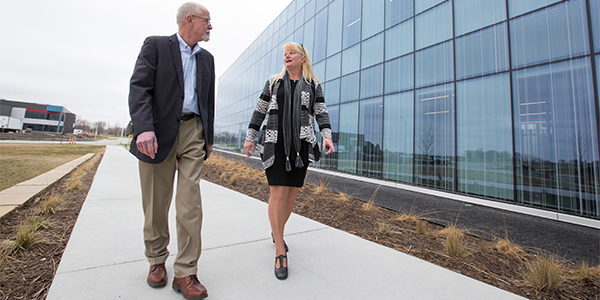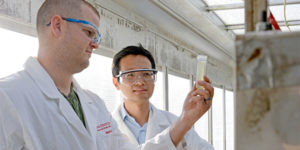
ISU Research Park Boosts Learning, Economic Development
Five years ago, Sara Hunter moved from Vermeer Corp. headquarters in Pella, Iowa, to the Iowa State University Research Park in south Ames. Hunter (’06 animal science) oversees the day-to-day partnership between Iowa State and Vermeer, a family-owned and operated manufacturer of agricultural and industrial equipment.
“The proximity to campus is a benefit to students and our team members. The ability to allow students to work on realworld projects while they’re continuing to go to school is a big piece of it,” she says. “Being able to collaborate with the university and recruit technology-based talent is key.”
After outgrowing their original space, the research park constructed the Vermeer Applied Technology Hub in 2016 and leases it to the company.
“The new multi-use building includes labs, offices and an equipment high-bay to allow our team members and Iowa State students and faculty to work side-by-side on technology advancements of Vermeer equipment,” Hunter says. “The building fosters an environment for software engineers to excel in the development of practical, affordable and modular equipment technology.”
Campus collaborations
Hunter builds relationships with staff, faculty, students and the Ames community to complete projects and build brand awareness for Vermeer. That includes supervising a crew of students, handling technology needs for the office and planning events. She also serves as an adviser to the College of Agriculture and Life Sciences Student Council, volunteering her time to meet with the club and offer industry guidance to its members.

Capitalizing on their presence in the Iowa State University Research Park, Sara Hunter builds relationships for Vermeer with staff, faculty, students and the Ames community to complete projects and build brand awareness. (Christopher Gannon/Iowa State University)
Edan Lambert, a junior in animal science and president of the college’s student council, spent this year as part of the Vermeer International Leadership Program. She found it so valuable that she added leadership studies as a minor.
A study abroad trip last January took her to the Netherlands where her leadership studies class visited several organizations including the Vermeer EMEA (Europe, Middle East and Africa) regional office. For spring semester, a group project in her global leadership course included regular video chats with a representative from Vermeer-Brazil to learn about Brazil’s culture and its environmental issues.
“While I have already gained so much from being a part of this program, I hope to gain a better understanding of leadership on a local, national and cultural level,” Lambert says. “I also want to be more equipped from a cooperative standpoint so I can be a better employee and colleague in the future.”
New building, new partnerships
After moving into the new building last March, Vermeer was joined by several tenants. Colin Hurd (’13 agricultural studies), founder of Smart Ag, jumped at the chance to move his start-up into the building.
“One of the big needs for Smart Ag in automating farm equipment is a facility that we can pull equipment into and work on. This building is ideal for that because they have a huge bay downstairs, and we’ve been able to lease a little bit of space for that. We can pull our tractor in to work on it, and have our office upstairs,” he says.
The Vermeer-Smart Ag relationship is just one of many agricultural connections at the research park—more than 40 percent of companies in the park are related to agriculture.
Like Hurd, several College of Agriculture and Life Sciences alumni, faculty and students are taking what they discover in labs and classrooms to strike out on their own and create businesses. New enterprises are filling several buildings going up at, and around, the research park.
Magnet for large and small firms
The Iowa State University Research Park is a 400-acre development with more than 650,000 square feet of current building space located just south of the Iowa State campus. The park helps international companies like John Deere, Boehringer Ingelheim, Vetmedica and Merck, as well as startups looking to deepen their relationship with the Iowa State research enterprise and talent pipeline.
“We connect our tenants with the resources they need to grow their business; whether that is talent, the research infrastructure at Iowa Sate, specialized facilities and equipment, business development expertise or financing,” says Steve Carter, president of the Iowa State University Research Park and director of the Iowa State University Pappajohn Center for Entrepreneurship.
The spirit of entrepreneurship is strong in the College of Agriculture and Life Sciences and in agriculture, says Carter. “Many of the park’s more than 60 companies are agricultural, and several are led by ag and life sciences alumni or faculty.”
For example:
- VariFAS Biorenewables LLC was cofounded by a team of researchers including agriculture and life sciences faculty members Basil Nikolau and Marna Nelson. The company’s goal is to produce biorenewable chemicals economically, help partners create environment-friendly products and contribute to building a bio-based sustainable chemical industry.
- Pat Schnable (’86 PhD agronomy), Charles F. Curtiss Distinguished Professor in Agriculture and Life Sciences, is managing partner of Data2Bio LLC, that helps clients on six continents with projects ranging from mapping and cloning individual genes to designing and conducting multiyear plant breeding programs relying on genomic selection.
- Nathan Davis (’15 food science, global resource systems) is the founding partner of Ideopak, which provides customized packaging solutions for food and pharmaceutical companies.
Many companies navigate to the research park after forging relationships elsewhere on campus, usually through research.

Martin Gross, left, and Zhiyou Wen take a sample of algae in the portable algae water-treatment unit. Their business, Gross-Wen Technologies located at the research park, is commercializing an algal wastewater treatment technology developed in partnership with Iowa State. (Photo: Center for Crops Utilization Research)
Deere is setting up a research and innovation center collaborating with, among others, Matt Darr in the agricultural and biosystems engineering department. Darr, who was recently named to the Kinze Manufacturing Fellowship in Agricultural and Biosystems Engineering, has conducted several projects with Deere, many dealing with biomass harvesting equipment at Iowa State’s BioCentury Research Farm (BCRF).
Gross-Wen Technologies is commercializing an algal wastewater treatment technology developed at the BCRF and the Center for Crops Utilization Research. It has offices at the park and is part of the Iowa State University Startup Factory and Ag Startup Engine (read more on page 15). Martin Gross (’11 biology, ’13 MS food science and technology, ’15 PhD ag and biosystems engineering, food science and technology) is a co-founder with Zhiyou Wen, a food science and human nutrition professor.
In the right place
Location is a big factor of the park’s success, says Lisa Lorenzen (’89 genetics, ’94 PhD genetics), a member of the research park’s board as well as executive director of the Iowa State University Research Foundation (ISURF) and director of the Office Of Intellectual Property and Technology Transfer, which have offices at the park.
Lorenzen’s offices negotiate research contracts between Iowa State researchers and industry, and provide commercialization services, including those related to protecting and marketing intellectual property.
“Research park companies have licensed technologies from ISURF, negotiated research contracts with us and have been helped through introductions to other units and resources,” Lorenzen says. “We also work with the startup companies (at the park), primarily from an intellectual protection and licensing standpoint.”
“One of the key strengths of the research park is its location: we are in a rural environment, surrounded by some of the richest agricultural resources in the world, both in terms of intellectual capital and landscape. The research park is uniquely positioned to help companies and entrepreneurs take advantage of that infrastructure,” Carter says. “We’ve grown to a point that we have some critical mass, and imagine that in the next 20 years, even more companies with agricultural ties will call the research park home.”



